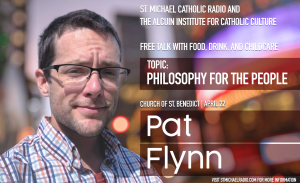St. Hilary of Poitiers on God the Father
St. Hilary was a staunch defender of the divinity of Christ. He was a gentle and courteous man, devoted to writing some of the greatest theology on the Trinity, and was like his Master in being labeled a “disturber of the peace.” In a very troubled period in the Church, his holiness was lived out in both scholarship and controversy. He was bishop of Poitiers in France.
Raised a pagan, he was converted to Christianity when he met his God of nature in the Scriptures. His wife was still living when he was chosen, against his will, to be the bishop of Poitiers in France. He was soon taken up with battling what became the scourge of the fourth century, Arianism, which denied the divinity of Christ.
The Trinity is one of the most complex teachings of the Church. Here is one of the best short videos on the Trinity:
Here St. Hilary writes about God the Father:
But God can never be anything but love, or anything but the Father: and He, Who loves, does not envy; He Who is Father, is wholly and entirely Father. This name admits of no compromise: no one can be partly father, and partly not. A father is father in respect of his whole personality; all that he is present in the child, for paternity by piecemeal is impossible: not that paternity extends to self-generation, but that a father is altogether father in all his qualities, to the offsprings born of him. According to the constitution of human bodies, which are made of dissimilar elements, and composed of various parts, the father must be father of the whole, since a perfect birth hands on to the child all the different elements and parts, which are in the father. The father is, therefore, father of all that is his; the birth proceeds from the whole of himself, and constitutes the whole of the child. God, however, has no body, but simple essence: no parts, but an all-embracing whole: nothing quickened, but everything living. God is therefore all life, and all one, not compounded of parts, but perfect in His simplicity, and, as the Father, must be Father to His begotten in all that He Himself is, for the perfect birth of the Son makes Him perfect Father in all that He has. So, if He is proper Father to the Son the Son must possess all the properties of the Father. Yet how can this be, if the Son has not the quality of prescience, if there is anything from His Author, which is wanting in His birth? To say that there is one of God’s properties which He has not, is almost equivalent to saying that He has none of them. And what is proper to God, if not the knowledge of the future, a vision, which embraces the invisible and unborn world, and has within its scope that which is not yet, but is to be?
Moreover Paul, the teacher of the Gentiles, forestalls the impious falsehood, that the Only-begotten God was partially nescient. Listen to his words, Being instructed in love, unto all riches of the fulness of understanding, unto knowledge of the mystery of God, even Christ, in Whom are all the treasures of wisdom and knowledge hidden. God, even Christ, is the mystery, and all the treasures of wisdom and knowledge are hidden in Him. But a portion is one thing, the whole another: a part is not the same as all, nor can all be called a part. If the Son does not know the day, all the treasures of knowledge are not in Him; but He has all the treasures of knowledge in Him, therefore He is not ignorant of the day. But we must remember that those treasures of knowledge were hidden in Him, though not, because hidden, therefore wanting. As in God, they are in Him: as in the mystery, they are hidden. But Christ, the mystery of God, in Whom are all the treasures of knowledge hidden, is not Himself hidden from our eyes and minds. Since then He is Himself the mystery, let us see whether He is ignorant when He does not know. If elsewhere His profession of ignorance does not imply that He does not know, here also it will be wrong to call Him ignorant, if He does not know. In Him are hidden all the treasures of knowledge, and so His ignorance is an economy rather than ignorance. Thus we can assign a reason for His ignorance, without the assumption that He did not know.
St. Hilary – Pray for us

